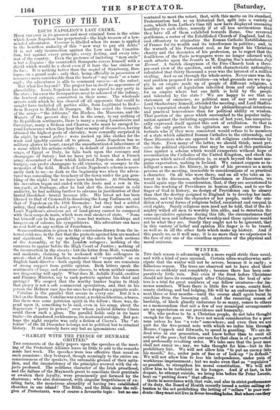TOPICS OF THE DAY.
LOUIS NAPOLEON'S LAST CRIME.
Man TREASON in its grossest and most criminal form is the crime which Louis Napoleon has perpetrated—the high treason of a low- minded adventurer. Courage is libelled when its name is applied to the heartless audacity of this " new way to pay old debts." It is not only insurrection against the Law and the Constitu- tion, but against every principle, every feeling,. and every inte- rest of the country. Even the pretence of imitating ." mon oncle" is but a disguise : the counterfeit Bonaparte covers himself with a shield which would be a cheat even if it bore the bar sinister on its face. It is nothing better than the sequel of Strasbourg,. Bou- logne, on a grand scale ; only that, being officially in possession of resources more considerable than the boots of " my uncle " or a tame eagle, the adventurer is able to command success—at the outset.
But what lies beyond ? The project has in itself no appearance of plausibility. Louis Napoleon has made no appeal to any party in the state ; for even the Bonapartists must be ashamed of the infamy, the lowbred outrage, committed in their name. The wholesale arrests with which he has cleared off all opponents that could be caught have included all parties alike, from Legitimist to Red— from Berryer to Michel de Bourges. He has seized the Generals of the army—" the Africans," the Roches, the Massenas, and the Murats of the present day : but in the army, to say nothing of its Republican sentiments, there is many a young Lamoriciere and Cavaignac, many a Bede= and Charras, who must be enraged be- yond forbearance when they hear that so many of themselves, having attained the highest posts of chivalry, were cowardly surprised in the night, by armed police: were packed up like clothes for the wash and ignobly carried off to prison. Louis Napoleon has no military glories to boast, except the unauthenticated inheritance of a name which his actions refute ; in default of Austerlitz or Ma- rengo, of Egypt or Italy, he falls back upon the sausages and champagne of Satory : but we have yet to learn that a French army, descendant of those which followed Napoleon shoeless and hungry, can prefer champagne to old victories, or sausages to the memories of the field. Much of Louis Napoleon's scheme is neces- sarily dark to us—as dark as the beginning was when the adven- turer was concealing the treachery of the dawn under the gay gam- bling of the night : but we have seen him before. At Strasbourg, his invention began and ended with the boots and a row in the inn-yard ; at Boulogne, after he had shot the lieutenant in cold audacity, he had nothing further to advance in justification of that brutal bloodshed—brutal because idle. His latest act has been likened to that of Cromwell in dissolving the Long Parliament, and that of Napoleon on the 18th Brumaire : but they had a settled policy, they embodied a real power, they had some state motive. Louis Napoleon's atrocious act of land-piracy cannot be compared with their coups de main, which were real strokes of state. " None but himself can be his parallel"; none but waiters, blacklegs and hangers-on of saloons, his sympathizers. His adventure can have no real hold on any section' of Frenchmen. Some confirmation is given to this conclusion drawn from the in- ternal evidence, in the fact that the protests against him are marked and significant. We say nothing of the edicts by both sections of the Assembly, or by the London refugees ; nothing of the summons to appear before the High Court of. Justice ; nothing of the insurrection in the streets : but the letter from Mole, venerable and moderate, claiming to be reckoned with his colleagues in arrest—that of Leon Faucher, moderate and " respectable" as an English bank-director—both signify that those men are conscious of strong support from public opinion. Both letters speak the sentiments of large and numerous classes, to whom neither cannon nor dragooning will apply. What does M. Achille Fould, creditor and Finance Minister, say to such portents against his chief and protege ? We suspect that the worthy banker begins to think that piracy is not a safe commercial speculation, and that in his person the Hebrew race has for once been duped on a gigantic scale.
Cataline is the parallel that occurs to every one. But it is a libel on the Roman. Cataline was a roué, a reckless libertine, a bravo. But there was some patrician spirit in the fellow ; there was, de- pend upon it, something to be said, even in his camp, about the degenerate " party in power," over whose judicial debates Cicero could throw such a gloss. The parallel holds only in its baser traits—its abandoned recklessness, its nocturnal outrage. But per- haps the night surprise was only a fiction of Cicero's. The " at- tentat " of the 2d December belongs not to political but to criminal history. It can scarcely have any but an ignominious end.


























 Previous page
Previous page